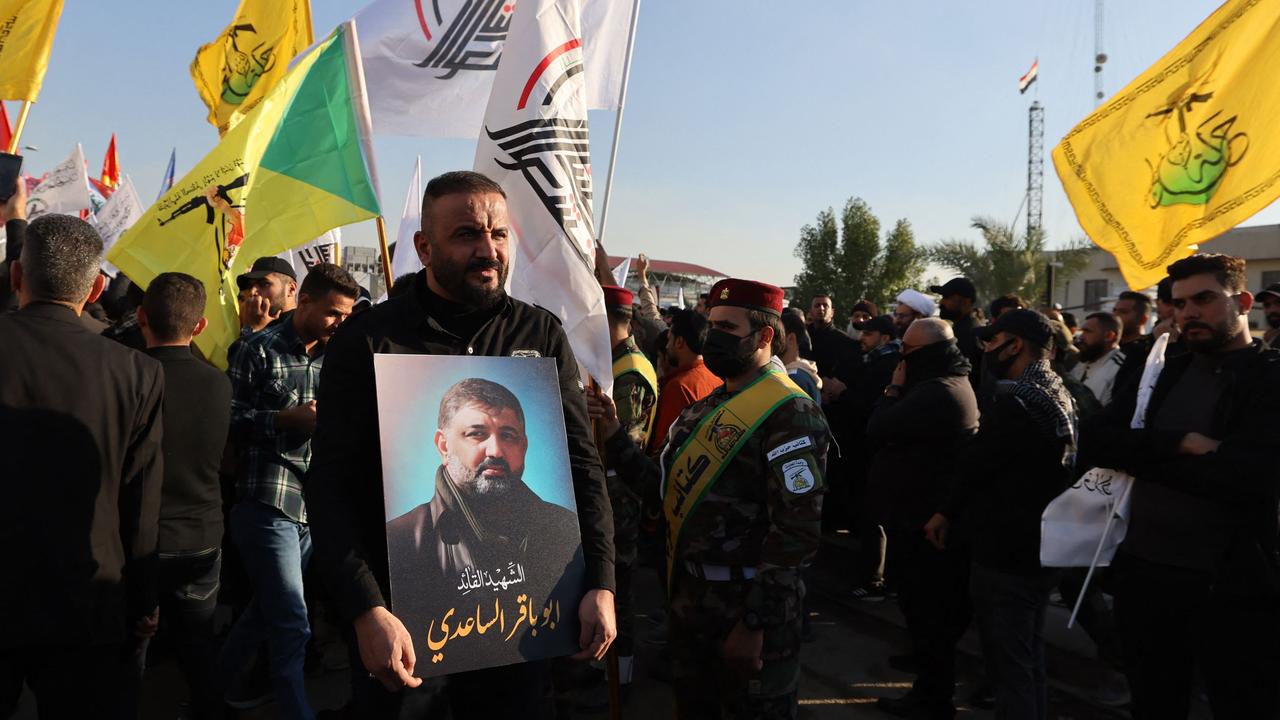Iranian proxies have carried out multiple assaults on US bases in Iraq and Syria since the conflict in Gaza began on October 7, 2023. The latest attack occurred on January 28, 2024, when a drone strike targeted the US base near the Syrian al-Tanf region on the Syrian-Jordanian and Iraqi borders. Three American soldiers were killed and around 40 others were injured in this attack, which the Iraqi Hezbollah Brigades claimed responsibility for.
In retaliation, the US launched a series of strikes against 85 targets in Iraq and Syria on February 2, 2024, using long-range Rockwell B-1 Lancer. The US air strikes persisted along a 130-kilometer stretch from Deir ez-Zor city to the Syrian-Iraqi border, targeting various locations. The Syrian Observatory for Human Rights reports that approximately 29 members of these militias were killed during those attacks, which targeted 28 sites. According to Iraqi estimates, approximately 16 people were killed and 25 others were injured.
The facilities targeted encompassed command and control centers, intelligence centers, missiles, and logistical facilities supplying weapons and ammunition to Iraqi militias attacking US and coalition forces, as stated by the US Central Command. Notwithstanding the recurrent assaults carried out by pro-Iranian militias against United States installations since the commencement of the conflict in Gaza, the drone attack on Tower 22 marked a significant shift, given its departure from the customary arenas in Iraq and Syria and expansion to the Jordanian border.
The Iraqi Hezbollah Brigades claimed responsibility for the assaults on the Tower 22 outpost situated on the Jordanian-Syrian border. This increased pressure on US President Joe Biden due to the ongoing attack on US bases. Former president and presidential candidate Donald Trump criticized the current administration’s policies, given the killing of approximately three US soldiers and injuries to others in this attack.
As a consequence, on February 7, the United States retaliated by specifically targeting Abu Baqir al-Saadi, a senior commander within Kata’ib Hezbollah tasked with facilitating the transfer of weapons to militias overseas and providing logistical support to the Iraqi Hezbollah Brigades. Washington holds him accountable for directly orchestrating attacks on US forces, particularly the strikes aimed at its base on the Jordanian-Syrian border.
US Stance
The United States is being cautious in its response to Iraqi militias to prevent escalation with Iran and to maintain ongoing discussions with Iraq about the US withdrawal and the termination of the international coalition forces mission. Any US escalation towards Tehran or its agents could increase internal Iraqi demand for the withdrawal of US forces, especially since Iraqi sovereignty is impacted by the ongoing US presence and the reciprocal attacks between the United States and the militias, particularly given the precarious situation in Baghdad, which serves as a battleground for multiple powers.
However, due to mounting pressure on the current US administration led by Vice President Biden, factors associated with the US electoral landscape, and the imperative to dissuade Iranian-backed militias, a retaliatory strike was initiated in response to the ongoing assaults on US bases in Gaza, with an emphasis on military deterrence. A total of 166 attacks were directed at US military bases, with 67 occurring in Iraq and 98 in Syria. Tower 22 was the target of the final attack, in response to which the United States assassinated Abu Baqir al-Saadi, the head of the Iraqi Hezbollah Brigades, on February 7. This action was intended to reassure the US interior that US forces would not be targeted and that any assaults on them would be met with resistance.
It is evident that the US strikes against Abu Baqir al-Saadi conveyed messages about the possibility of carrying out additional military operations against formidable targets in the near future in the event that Iranian-backed militia attacks on US bases persist. In addition, these strikes would potentially bolster Biden’s electoral prospects. Democrats, including Senator Jack Reed, commended the US military strikes against Iraq and Syria, viewing them as a robust response. Nevertheless, the United States is adamant that the response adheres to the established rules of engagement, as emphasized by US National Security Council spokesman John Kerry’s statements that “Washington is not looking for a war with Iran.”
On the other hand, the ongoing escalation by Iranian proxies in the context of the Gaza conflict would mean regional expansion of the conflict, which is undesirable to Washington, particularly given that the escalation jeopardizes the ceasefire efforts in Gaza. The locations targeted during the US attacks on Syria and Iraq seem to indicate that the objective is to cause harm and losses to Iranian proxies to thwart their attacks against US forces and prevent the scope of escalation from growing, particularly considering the availability of alternative arenas, including the Red Sea, where the Houthis are escalating their attacks.
In a related vein, the United States remains keen to prevent escalation that could result in a full-scale conflict in the Middle East. Given the ongoing negotiations to conclude the mission of US forces in Iraq, Washington is currently seeking to avoid coming under any pressure. The initiation of a significant US military operation would further complicate or derail the talks, particularly given the internal pressure in Iraq to establish a precise timetable for the withdrawal of US forces, expedite their departure, and prevent Iraq from becoming a battleground between external powers. Consultations between the United States and Iraq commenced via the US-Iraq Higher Military Commission on January 27, with the objective of addressing the conclusion of the international coalition’s operations in Iraq.
In this context, the United States is cautious in the ongoing talks to avoid a situation similar to the one in Afghanistan following the US withdrawal on August 31, 2021, particularly due to concerns about the Iraqi government’s ability to manage the pro-Iranian militias in Iraq. Within the context of the US withdrawal, the proliferation of weapons among Iraqi militias and the expansion of the Popular Mobilization Forces remain crucial topics to be discussed.
Iraqi Government and Militias
The US retaliatory strike in response to an attack by Iraqi militias on the US Tower 22 outpost and Washington’s targeting of Kataib Hezbollah leader Wissam Muhammad Saber, also known as Abu Baqir al-Saadi, in Baghdad on February 7 signal an ongoing cycle of mutual attacks between US forces and Iraqi militias. In response, the Kata’ib Sayyid al-Shuhada and the al-Nujaba movement vowed to avenge al-Saadi’s death and to continue attacking US interests and retaliating against any US attacks.
This predicament places the Iraqi government, led by Muhammad Shiaط Al-Sudani, in a precarious position between the inability to regulate the activities of Iraqi militias and the imperative of US withdrawal without undermining Iraqi sovereignty. Furthermore, it risks internal pressures and demands for the government’s departure in the event of ongoing security instability and the lack of progress in the talks with Washington regarding the US withdrawal, especially after 100 representatives of the Iraqi Shiite community signed a petition on February 10 during a parliament session highlighting the necessity of US forces leaving Iraq.
While there is internal pressure on al-Sudani’s government for the US forces to leave Iraq, a potential scenario is that the US forces will not leave Iraq permanently and will resort to reducing the number of its forces or redeploying them in the Kurdistan region.
The Iraqi government’s calculations remain influenced by various factors, including the militias’ status and the government’s capacity to regulate their activities; the ability of the Iraqi government to address potential security disruptions following the US withdrawal; the economic situation and the persistent crisis involving the high dollar price in the Iraqi market; the limitations imposed by Washington on dollar transfers to Iraq; and prohibiting Iraqi banks affiliated with certain factions with the intention of exerting pressure on them due to their lack of dollar access. This could exacerbate the economic crisis, which could be particularly detrimental given the government’s endeavors to establish stability within the country and engage in regional development initiatives, such as the Turkey-Iraq Development Road Project.
Iran’s Stance
In the context of the war in Gaza and the mutual attacks between the United States and Iraqi militias, Iranian President Ibrahim Raisi stated that Iran “will not start any war, but if anyone wants to bully us, they will receive a strong response.” Despite the assassination of several influential leaders in the Iraqi Hezbollah Brigades, including Abu Baqir al-Saadi, the earlier reciprocal attacks between Iraqi militias and US bases, and the US retaliatory actions of targeting leaders in the Iraqi al-Nujaba Movement (e.g. Mushtaq Jawad Kazim al-Jawari), military installations, supply depots, and headquarters in the Jurf Sakhar neighborhoods south of Baghdad, Tehran refrained from expanding the conflict beyond its controlled boundaries.
Iran appears to be strategically employing proxies’ cards at opportune moments while avoiding further complications with the United States in other aspects, including the Iranian nuclear programme and the economic sanctions that have been imposed on the country. As such, it is evident that Iran is pressuring Iraqi militias to avoid further escalation, as seen in the Hezbollah Brigades’ announcement to halt attacks on US targets after the militias targeted the US Tower 22 outpost.
However, Tehran retains the ability to utilize its proxies to exert pressure on the United States at any moment in the context of the forthcoming regional arrangements and balances as well as developments in Gaza. Iranian goals in playing the proxies’ cards may also include pressuring the United States to pull its forces out of Syria and Iraq. It is noteworthy to mention that within the United States, there exists an internal consensus that US policies ought to incorporate initial measures for a withdrawal from Syria while simultaneously ensuring a stable post-withdrawal environment.
In summary, notwithstanding the Iraqi militias’ adoption of the Iranian strategy, they have a self-desire to bolster their position and influence among Iran’s proxies in the area and exploit these assaults under the guise of supporting Hamas in Gaza. Despite persistent and reciprocal strikes, the extent of the confrontations between the involved parties did not surpass what is customary. Tehran may restrain its proxies from escalating or retaliating attacks following the killing of al-Saadi. However, it is improbable that these attacks will cease, as they bolster Iranian influence and provide Tehran with additional leverage in various areas, such as the conflict in Gaza or the Iranian nuclear issue, by exerting pressure through its agents.













